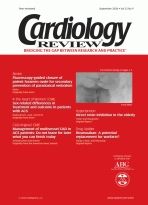Successful PCI in an elderly woman
A 75-year-old woman who experienced chest discomfort that caused her to awaken and persisted as retrosternal pain was admitted to the emergency department.
A 75-year-old woman who experienced chest discomfort that caused her to awaken and persisted as retrosternal pain was admitted to the emergency department. Her medical history included arterial hypertension, diabetes, hypercholesterolemia, and a 50-pack-year history of cigarette smoking, but she had no history of major medical events. Her drug regimen consisted of a once-daily dose of aspirin (100 mg), metoprolol (50 mg), felodipine (5 mg), and simvastatin (20 mg), and a twice-daily dose of gliclazide (40 mg).
On physical examination, she had dyspnea and appeared uncomfortable. Her respiratory rate was 25 breaths per minute, her oxygen saturation was 88% on room air, and her blood pressure was 170/90 mm Hg. Auscultation of her chest revealed crackles in the lungs and a regular rhythm with an S4 gallop. Cardiomegaly and bilateral edema were documented by a chest radiograph. An electrocardiogram showed a left bundle branch block, and blood tests indicated elevated levels of total creatinine kinase and troponin T. Echocardiography documented a markedly reduced ejection fraction of 0.40, based on an anterolateral hypokinesia with dilated left ventricle.
In the emergency department, the patient received furosemide, nitroglycerin, clopidogrel, and low-molecular-weight heparin. Subsequent coronary angiography demonstrated 3-vessel disease. Approximately 5 hours after her symptoms started, the patient underwent percutaneous coronary intervention (PCI). During the procedure, 2 bare metal stents were deployed in the left anterior descending artery and 1 drug-eluting stent was deployed in the right coronary artery. The patient was discharged from the hospital with a 12-month prescription for clopidogrel 75 mg daily.
